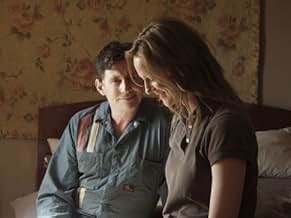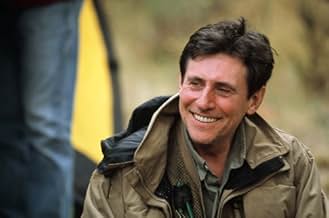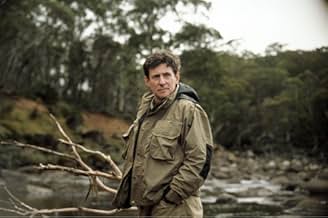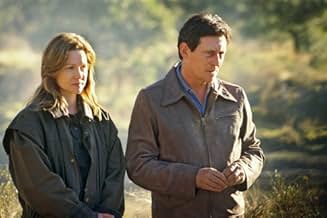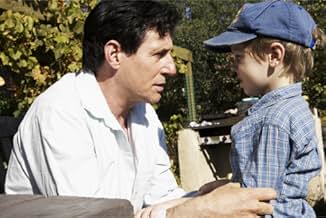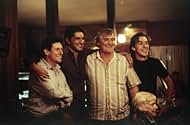IMDb RATING
6.3/10
7.2K
YOUR RATING
After four men on a fishing trip discover a dead body in the water, they choose to delay reporting it and continue fishing.After four men on a fishing trip discover a dead body in the water, they choose to delay reporting it and continue fishing.After four men on a fishing trip discover a dead body in the water, they choose to delay reporting it and continue fishing.
- Awards
- 11 wins & 22 nominations total
- Director
- Writers
- All cast & crew
- Production, box office & more at IMDbPro
Featured reviews
I recently saw Jindabyne in Cannes and it is a brilliant movie. Thanks to a wonderful cast and Ray Lawrence the script comes alive on the screen.
Four fishing buddies find a dead girl in the river. They don't report their find until a few days later. This causes anger and disappointment from their families and the rest of the town; reactions they don't seem capable of understanding.
Byrne and Linney, especially, turn every line and every second into an intense moment. They're human beings, and it shows. You understand why their characters act like they do, but you don't always accept it.
Four fishing buddies find a dead girl in the river. They don't report their find until a few days later. This causes anger and disappointment from their families and the rest of the town; reactions they don't seem capable of understanding.
Byrne and Linney, especially, turn every line and every second into an intense moment. They're human beings, and it shows. You understand why their characters act like they do, but you don't always accept it.
This is an intriguing, evocative and multilayered film superbly acted and wonderfully filmed (mostly in single takes, it seems). It is also rather slow and meandering, and problematic. The basic plot could be set almost anywhere failure of personal relationships in the context of a failure of civic duty, but Ray Lawrence has chosen to adapt Raymond Carver's short story of the fishermen who took their time over reporting finding a woman's body to a highly specific place, Jindabyne, NSW, and to include the vexed question of black/white relationships in Australia.
As is pointed out in one of those awful cheery 1960s documentary being shown to the kids in the local primary school, the present day Jindabyne is a "second chance" sort of place, the old town having disappeared under the waters of Lake Jindabyne during the creation of the Snowy Mountains Hydro Scheme, though at very low water levels the old church steeple is said to poke out of the water. Unfortunately, as we are shown in the opening sequence there is still evil in the new town in the shape of the local electrician (Chris Heywood, very nasty), who likes to hunt and kill young women. It is his victim's body the four fishing buddies, Stewart, Carl, Rocco and Billy, find in the stream, tie to a log, fish for a day, and then the next morning decide to raise the alarm.
When it becomes public that the four delayed reporting their find to go fishing (why didn't they lie about when they found the body?) there is a predictable uproar. The dead woman was aboriginal and the local aboriginals are particularly upset since they see this as symptomatic of whitey attitudes). Rocco's aboriginal girlfriend is not impressed. But the greatest emotional impact falls on Stewart (an Irishman) and his American wife Claire whose relationship is already rocky.
At one point I thought Claire was going to crack the case, but instead we get a literally hazy scene where some kind of reconciliation between black and white is attempted. After seeing the superb "Ten Canoes" recently I found the whole aboriginal storyline contrived. What I did think was very powerful and affecting was the portrayal of a damaged marriage. Gabriel Byrne does not put a foot wrong as Stewart, an ordinary bloke resigned to what little emotional comfort he can get from his family, and Laura Linney gives great depth to her role as his wife Claire, a woman for whom motherhood is a daunting task.
The rest of the cast are fine. Debra-Lee Furness as Carl's wife Jude makes a dislikeable character understandable, John Howard as Carl puts in a solid performance and there are two good performances from child actors Eva Lazzaro as Jude's disturbed granddaughter, and Sean Rees-Wemyss as Stewart and Claire's son Tom.
Ray Lawrence clearly did not set out to create a crime story but he certainly shows that crime can have some unexpected collateral damage. He also has contributed to the "Cinema of Unease", a phrase Sam Neill once used to describe New Zealand cinema, by setting a story about personal and public guilt in such a glorious setting.
As is pointed out in one of those awful cheery 1960s documentary being shown to the kids in the local primary school, the present day Jindabyne is a "second chance" sort of place, the old town having disappeared under the waters of Lake Jindabyne during the creation of the Snowy Mountains Hydro Scheme, though at very low water levels the old church steeple is said to poke out of the water. Unfortunately, as we are shown in the opening sequence there is still evil in the new town in the shape of the local electrician (Chris Heywood, very nasty), who likes to hunt and kill young women. It is his victim's body the four fishing buddies, Stewart, Carl, Rocco and Billy, find in the stream, tie to a log, fish for a day, and then the next morning decide to raise the alarm.
When it becomes public that the four delayed reporting their find to go fishing (why didn't they lie about when they found the body?) there is a predictable uproar. The dead woman was aboriginal and the local aboriginals are particularly upset since they see this as symptomatic of whitey attitudes). Rocco's aboriginal girlfriend is not impressed. But the greatest emotional impact falls on Stewart (an Irishman) and his American wife Claire whose relationship is already rocky.
At one point I thought Claire was going to crack the case, but instead we get a literally hazy scene where some kind of reconciliation between black and white is attempted. After seeing the superb "Ten Canoes" recently I found the whole aboriginal storyline contrived. What I did think was very powerful and affecting was the portrayal of a damaged marriage. Gabriel Byrne does not put a foot wrong as Stewart, an ordinary bloke resigned to what little emotional comfort he can get from his family, and Laura Linney gives great depth to her role as his wife Claire, a woman for whom motherhood is a daunting task.
The rest of the cast are fine. Debra-Lee Furness as Carl's wife Jude makes a dislikeable character understandable, John Howard as Carl puts in a solid performance and there are two good performances from child actors Eva Lazzaro as Jude's disturbed granddaughter, and Sean Rees-Wemyss as Stewart and Claire's son Tom.
Ray Lawrence clearly did not set out to create a crime story but he certainly shows that crime can have some unexpected collateral damage. He also has contributed to the "Cinema of Unease", a phrase Sam Neill once used to describe New Zealand cinema, by setting a story about personal and public guilt in such a glorious setting.
In the Australian town of Jindabyne, the former race champion Stewart Kane (Gabriel Byrne) works in a gas station with his partners and friends Carl (John Howard), Rocco (Stelios Yiakmis) and Billy (Simon Stone). His impassionate marriage with the unstable Claire (Laura Linney) has an unresolved issue since Claire left him when their son Tom (Sean Rees-Wemyss) was born. The great passion of Stewart is fishing and he organizes a weekend fishing trip in a remote river with his three great friends. On Friday afternoon, they park the car and hike and camp in the spot; while fishing, Stewart finds the naked dead body of an aboriginal young woman floating on the cold water. Stewart ties the leg of the woman to an arbor and they spend the weekend fishing. On Sunday afternoon, they return to the parking area and report their finding to the police. When the press releases the information, their public and private lives are deeply affected and the disturbed Claire questions Stewart's attitude while trying to help and apologize with the family of the dead aborigine.
"Jindabyne" has a storyline of great potential, with a morbid and polemic study of moral aspects of human (and consequently flawed) characters. Unfortunately the screenplay is not good and looses the focus of the main storyline entwined with many parallel and unresolved plots of supporting characters. Why Caylin-Calandria has such weird and morbid behavior? (It seems that because of the death of her mother, but it is never clear). The character of the old man that killed the aborigine is not developed. Why Claire became dysfunctional with the birth of her son? Why Stewart is still married with Claire? The attitude of Claire against her husband is annoying and in Brazil we have a saying that states "with a friend (or in this case wife) like that, Stewart does not need enemies". Anyway, the locations in Australia are stunning, the cast has great acting and it is worth watching this movie. My vote is seven.
Title (Brazil): Not Available
"Jindabyne" has a storyline of great potential, with a morbid and polemic study of moral aspects of human (and consequently flawed) characters. Unfortunately the screenplay is not good and looses the focus of the main storyline entwined with many parallel and unresolved plots of supporting characters. Why Caylin-Calandria has such weird and morbid behavior? (It seems that because of the death of her mother, but it is never clear). The character of the old man that killed the aborigine is not developed. Why Claire became dysfunctional with the birth of her son? Why Stewart is still married with Claire? The attitude of Claire against her husband is annoying and in Brazil we have a saying that states "with a friend (or in this case wife) like that, Stewart does not need enemies". Anyway, the locations in Australia are stunning, the cast has great acting and it is worth watching this movie. My vote is seven.
Title (Brazil): Not Available
This film is about a group of 4 men who discovers a dead body during a fishing trip. They continue fishing instead of reporting it to the police. This sparks outrage in the village, and the 4 men have to deal with the aftermath.
The character development is excellent. Each character is unique and different. Laura Linney deals with the tragedy by doing good deeds to redeem herself, while Gabriel Byrne deals with it by denial. The little girl, with an unfortunately unusual name, is provocatively antisocial. Billy is the histrionic one. Each character is different from another, and the interaction of them in the film is portrayed beautifully and convincingly in the film.
Laura Linney does the best job in the film. She is so convincing in her genuine attempt to redeem her husband's wrongdoings. The frustration that results from her husband's denial is painfully portrayed. The scene where she throws the vase at the ground is also a memorable display of emotion.
A comment says the film is dull. I am afraid I do not agree. This film is about the portrayal of different personalities when morality is in danger. The characters are so intriguing and complex, that just this alone makes viewing worthwhile.
The character development is excellent. Each character is unique and different. Laura Linney deals with the tragedy by doing good deeds to redeem herself, while Gabriel Byrne deals with it by denial. The little girl, with an unfortunately unusual name, is provocatively antisocial. Billy is the histrionic one. Each character is different from another, and the interaction of them in the film is portrayed beautifully and convincingly in the film.
Laura Linney does the best job in the film. She is so convincing in her genuine attempt to redeem her husband's wrongdoings. The frustration that results from her husband's denial is painfully portrayed. The scene where she throws the vase at the ground is also a memorable display of emotion.
A comment says the film is dull. I am afraid I do not agree. This film is about the portrayal of different personalities when morality is in danger. The characters are so intriguing and complex, that just this alone makes viewing worthwhile.
A fishing trip gone bad is one way of looking at JINDABYNE, but then you would miss the whole mystery of this film and how it examines the lives of others in a small Australian town, which on the surface may seem perfect. But in JINDABYNE you soon learn that beneath the ripples of the lake lie other factors which swirl to the surface and create a fascinating film and story. The wind whipping through the trees and the power lines that dot the hills make for a perfect background for this film.
Laura Linney, once and again, and Gabriel Byrne are two superb actors that make JINDABYNE come alive with strong performances, as well as from a seasoned cast. JINDABYNE offers us a film of human tragedy, as seen from both sides of the racial coin, and is a very timely film with all the evils that go on within today's global stage. In Ms. Linney, her face always mirrors a million emotions, and Mr. Byrne is the perfect foil for a marriage with issues. The final scenes are powerful and leave you with a question of, "what now might Jindabyne be in the near future?" However, with that said, I felt the film could have been edited a bit more tightly, and not taken so long with the development of characters and the build up to the final conclusion. But in watching the face of Laura Linney and her inner expressions, along with the writing, one can forgive the length of the film.
Laura Linney, once and again, and Gabriel Byrne are two superb actors that make JINDABYNE come alive with strong performances, as well as from a seasoned cast. JINDABYNE offers us a film of human tragedy, as seen from both sides of the racial coin, and is a very timely film with all the evils that go on within today's global stage. In Ms. Linney, her face always mirrors a million emotions, and Mr. Byrne is the perfect foil for a marriage with issues. The final scenes are powerful and leave you with a question of, "what now might Jindabyne be in the near future?" However, with that said, I felt the film could have been edited a bit more tightly, and not taken so long with the development of characters and the build up to the final conclusion. But in watching the face of Laura Linney and her inner expressions, along with the writing, one can forgive the length of the film.
Did you know
- TriviaGabriel Byrne accidentally stepped on a Brown Snake, one of the world's deadliest, while walking through the bush one day on the set. If he'd stepped on the other end he'd have been bitten. Gabriel Byrne told the director Ray Lawrence that he was almost killed, to which Lawrence replied: "No worries mate. You would have had 24 hours..."
- GoofsJust before the fishing trip, Stewart dyes his graying hair black. At the river, the gray reappears, but his hair inexplicably turns jet-black again upon his return.
- ConnectionsFeatured in At the Movies: Episode #3.22 (2006)
- How long is Jindabyne?Powered by Alexa
Details
- Release date
- Country of origin
- Official site
- Languages
- Also known as
- Jindabyne
- Filming locations
- Production companies
- See more company credits at IMDbPro
Box office
- Budget
- A$15,000,000 (estimated)
- Gross US & Canada
- $400,438
- Opening weekend US & Canada
- $28,298
- Apr 29, 2007
- Gross worldwide
- $6,044,112
- Runtime
- 2h 3m(123 min)
- Color
- Sound mix
- Aspect ratio
- 2.35 : 1
Contribute to this page
Suggest an edit or add missing content


